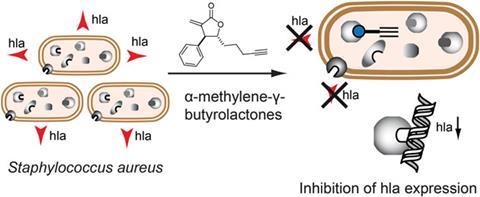Researchers in Germany looking to find unprecedented ways of combating bacterial infection have demonstrated that certain small molecules can reduce the ability of Staphylococcus aureus to cause disease. ‘The classic antibiotic approach puts bacteria in a life or death situation, meaning that they need to become resistant in order to survive. We aimed to find a way of reducing the ability of bacteria to make the toxins that harm eukaryote cells during infection, without putting them under selective pressure,’ explains Stephan Sieber of the University of Technology in Munich who led the study.
Transcriptional regulators control the virulence factors in bacteria, that enable a microorganism to establish itself within a host or enhance its potential to cause disease, by directly binding to DNA promoter regions of toxin-encoding genes. In the study, the researchers identified a series of a-methylene-?-butyrolactones that covalently modify cysteine residues on three transcriptional regulators in S. aureus, markedly decreasing the expression of a-haemolysin, one of the most prominent virulence factors.

Experts in chemical biology have praised the study. Rolf Breinbauer from the Graz University of Technology in Austria believes that it is a beautiful success story and says ‘the work deserves special attention as our established antibiotics are losing the edge as weapons against bacterial infection.’ Markus Kaiser of the University of Duisburg-Essen in Germany agrees that developing small molecules to suppress bacterial virulence is an innovative concept but believes that ‘its realisation is still hampered by the limited number of bacterial drug targets for which such small molecules can be developed’.
Although excited by their breakthrough, Sieber is realistic about the potential of the results. ‘Our small molecules need pharmacological optimisation to become drug-like. The next step is to find molecules that have an improved pharmacological profile in terms of their stability and so will justify animal studies’.






No comments yet